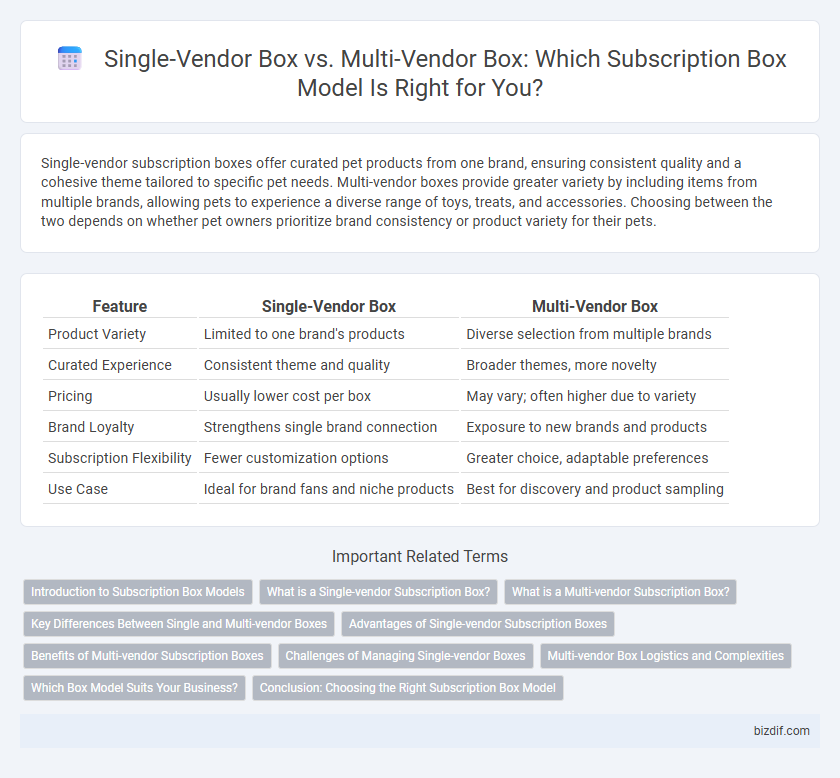Single-vendor subscription boxes offer curated pet products from one brand, ensuring consistent quality and a cohesive theme tailored to specific pet needs. Multi-vendor boxes provide greater variety by including items from multiple brands, allowing pets to experience a diverse range of toys, treats, and accessories. Choosing between the two depends on whether pet owners prioritize brand consistency or product variety for their pets.
Table of Comparison
| Feature | Single-Vendor Box | Multi-Vendor Box |
|---|---|---|
| Product Variety | Limited to one brand's products | Diverse selection from multiple brands |
| Curated Experience | Consistent theme and quality | Broader themes, more novelty |
| Pricing | Usually lower cost per box | May vary; often higher due to variety |
| Brand Loyalty | Strengthens single brand connection | Exposure to new brands and products |
| Subscription Flexibility | Fewer customization options | Greater choice, adaptable preferences |
| Use Case | Ideal for brand fans and niche products | Best for discovery and product sampling |
Introduction to Subscription Box Models
Single-vendor subscription boxes offer curated products from a single brand, ensuring consistent quality and a focused theme tailored to specific customer preferences. Multi-vendor subscription boxes aggregate products from various brands, providing a diverse selection that appeals to a broader audience and encourages product discovery. Choosing between these models depends on target market goals, customer experience design, and brand partnership strategies.
What is a Single-vendor Subscription Box?
A single-vendor subscription box features products exclusively from one brand or company, offering a curated experience focused on their unique range. This model allows for consistency in quality and theme, enhancing brand loyalty and simplifying inventory management. Customers receive a tailored selection that highlights the vendor's specialty or signature items each delivery cycle.
What is a Multi-vendor Subscription Box?
A multi-vendor subscription box features curated products sourced from various brands or sellers, offering a diverse selection that appeals to a broad audience. This format allows customers to discover new items and trends in one package, enhancing the overall value and excitement compared to single-vendor boxes. Multi-vendor boxes often target niche markets with specialized themes, creating unique experiences that single-brand boxes may not provide.
Key Differences Between Single and Multi-vendor Boxes
Single-vendor subscription boxes feature curated products exclusively from one brand, ensuring consistent quality and targeted branding, while multi-vendor boxes aggregate diverse items from multiple brands, offering variety and a broader consumer experience. Single-vendor boxes typically emphasize brand loyalty and specialized product expertise, whereas multi-vendor boxes prioritize discovery and value by combining complementary products. Pricing strategies also differ, with single-vendor boxes often being premium-priced due to focused selection, and multi-vendor boxes providing cost-effective sampling opportunities for customers.
Advantages of Single-vendor Subscription Boxes
Single-vendor subscription boxes offer consistent brand quality and a curated product experience directly from one company, ensuring a cohesive theme and customer trust. These boxes simplify inventory management and enable better control over product selection, packaging, and shipping processes. Customers benefit from specialized expertise and often receive exclusive items or early product releases from their favorite brand.
Benefits of Multi-vendor Subscription Boxes
Multi-vendor subscription boxes offer diverse product variety by incorporating items from multiple brands, enhancing customer excitement and satisfaction. They provide cost efficiency through curated selections that introduce subscribers to new and exclusive products, driving higher retention rates. This model supports cross-promotion among vendors, expanding market reach and increasing customer engagement.
Challenges of Managing Single-vendor Boxes
Managing single-vendor subscription boxes presents challenges such as limited product variety, which may reduce customer engagement and retention rates. Dependence on one supplier increases vulnerability to supply chain disruptions, impacting timely deliveries and inventory management. Additionally, optimizing pricing strategies becomes difficult due to lack of competition and constraints on discount offerings.
Multi-vendor Box Logistics and Complexities
Multi-vendor subscription boxes require intricate coordination between multiple suppliers, demanding robust inventory management systems to ensure timely fulfillment and product availability. The logistics involve synchronizing diverse shipping schedules, handling varied packaging requirements, and managing increased risk of delays or errors across vendors. Efficient communication channels and real-time tracking tools are crucial to mitigate complexities and maintain a seamless customer experience.
Which Box Model Suits Your Business?
Single-vendor subscription boxes offer consistent branding and curated products that strengthen customer loyalty and simplify inventory management. Multi-vendor boxes provide diverse product selections appealing to broader audiences and enable collaboration with multiple brands, expanding reach and reducing risk. Choosing the right box model depends on your business goals, target market, and operational capacity to deliver unique or varied experiences.
Conclusion: Choosing the Right Subscription Box Model
Choosing the right subscription box model depends on customer preferences and business goals. Single-vendor boxes deliver curated, consistent brand experiences, ideal for niche markets seeking depth in product selection. Multi-vendor boxes offer variety and discovery, appealing to consumers desiring diverse items from multiple brands in one package.
Single-vendor box vs Multi-vendor box Infographic

 bizdif.com
bizdif.com